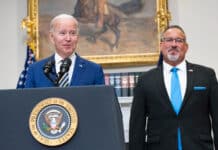This article, written by Katherine Kersten, was originally published on Center of the American Experiment’s website. Go to their website to read more of Kersten’s analyses.
On July 25, the Minnesota Supreme Court issued a ruling with the potential to transform K-12 education in the Twin Cities region for decades to come. The court decided that Cruz-Guzman v. State of Minnesota—a case in which plaintiffs seek court-ordered metro-wide racial balancing in the Twin Cities’ region’s public schools—can go forward.
Plaintiffs will now return to district court. There they will demand a comprehensive, legislatively mandated plan to distribute students—including those in suburban districts and charter schools—into schools across the metro area on the basis of their race and socio-economic status.
The remedy plaintiffs seek will likely cost taxpayers enormous sums and end the educational freedom—including open enrollment, charter schools, and PSEO (Postsecondary Enrollment Options)—that Twin Cities families currently enjoy. It may also change school district boundaries across the metro area.
One thing, at any rate, is certain: Any racial-sorting plan that results, whether it comes via a court victory or settlement, will fail to significantly raise the academic achievement of the poor, minority students it is ostensibly designed to help. The long, sad history of race-based busing makes that clear.
There’s a backstory to the Cruz-Guzman case, and it reveals the ideological motives that drive the plaintiffs’ lawyers.
Cruz-Guzman is the latest act in a crusade for metro-wide, race-based busing that activist attorneys—including Dan Shulman of Gray, Plan, Mooty and Myron Orfield of the University of Minnesota Law School—have been waging for almost 25 years. This crusade began in 1995, when Minnesota’s State Board of Education sought to win approval for a “metro-wide desegregation plan” under the sponsorship of Orfield, then a member of the legislature.
Orfield’s plan would have compelled busing at least 20,000 students, from as far as Jordan and Belle Plaine, across the Twin Cities region on the basis of their skin color. At the time, I detailed its numerous flaws in a report entitled “Good Intentions Are Not Enough: The Peril Posed by Minnesota’s New Desegregation Plan.”
Fortunately, Orfield’s metro-wide busing plan failed to gain traction. That same year, however, attorney Dan Shulman—who now represents the plaintiffs in Cruz-Guzman—filed a lawsuit with the same objective.
That suit, NAACP v. State of Minnesota (which I wrote about in the Star Tribune here) was settled in 2000 with the creation of “The Choice Is Yours” (CIY) program. The Choice Is Yours allowed low-income Minneapolis students to choose to attend school in one of a number of suburban school districts, among them Minnetonka, Edina, Wayzata, Hopkins and St. Louis Park. The academic performance of participating minority students was deeply disappointing, however. In fact, in a number of years, low-income Minneapolis students who stayed in city schools actually outperformed their CIY peers who chose to attend school in the suburbs.
In 2007, Orfield and his fellow activists shifted tactics. That year, a decisive U.S. Supreme Court ruling made clear that attempts to characterize racial imbalance as illegal “segregation” would not fly in federal court. In response, Orfield created a “desegregation” plan for the Eden Prairie Public Schools that bused students to schools—some across town from their homes—on the basis of income, not race.
I critiqued that plan here in the Star Tribune:
Finally, in 2015, Shulman filed Cruz-Guzman v. State of Minnesota in state court, and the Supreme Court has now ruled the case can go forward. (A Star Tribune piece I wrote about the lead-up to the case is here.)
I laid out the potentially disastrous consequences of a Cruz-Guzman-type case for Twin Cities students of all races in a comprehensive report entitled “Our Immense Achievement Gap: Embracing Proven Remedies While Avoiding a Race-Based Recipe for Disaster.”
Those consequences may soon become reality.
Katherine Kersten, a writer and attorney, is a Senior Fellow at Center of the American Experiment.












